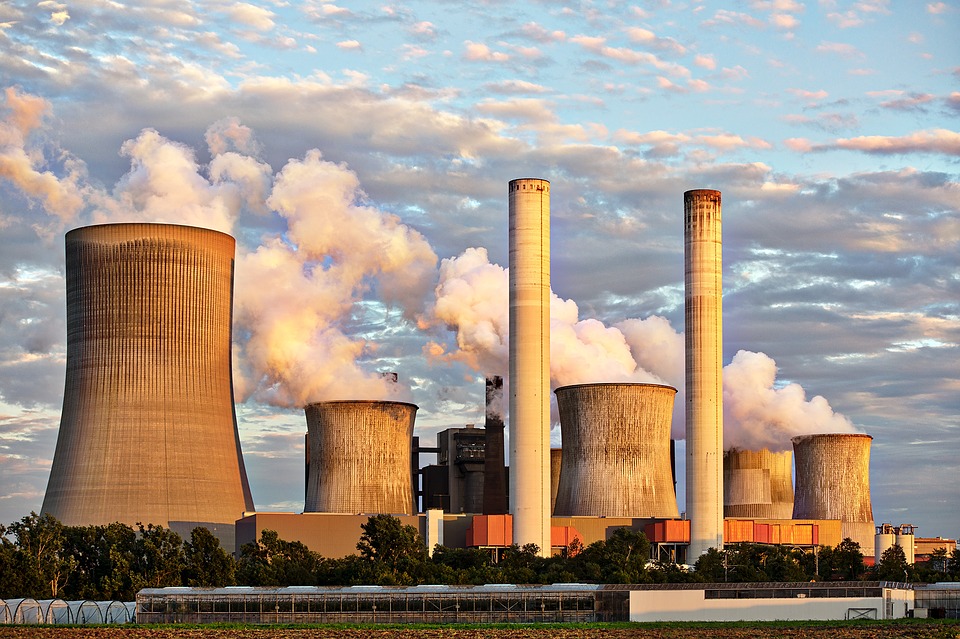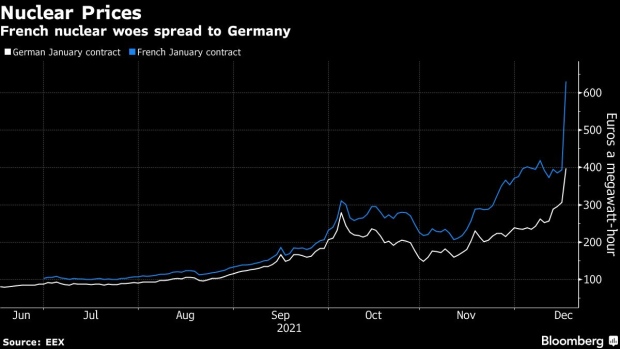SAFETY NOT THE CONCEN, PROFIT IS
EDF shares plunge after faults found at French nuclear power reactor
Shares in EDF plunged on Thursday after the French power giant found faults at a nuclear power station and shut down another plant using the same kind of reactors, leading it to cut its core profit goal for this year.

Shares in EDF plunged on Thursday after the French power giant found faults at a nuclear power station and shut down another plant using the same kind of reactors, leading it to cut its core profit goal for this year. France's Nuclear Safety Authority said EDF had informed it that it had detected cracks on the pipes of a reactor at the Civaux power plant in western France due to corrosion.
It said EDF, which has extended the outage of its Civaux station as a result and also stopped the Chooz plant in eastern France that uses the same technology, was investigating the cause of the faults. The watchdog will closely monitor EDF's review, it added. Separately, the French Institute of Radiological Protection and Nuclear Safety, another public agency, said checks on other EDF reactors were likely to be necessary.
Shares in EDF were down nearly 13% at 1410 GMT. The setback comes as France plans a major nuclear power station building programme, diverging from neighbour Germany which retreated from nuclear power after Japan's Fukushima nuclear disaster in 2011.
The outage of the four reactors, with a combined daily capacity of 6 Gigawatt (GW), equivalent to around 13% of current availability in France, also comes close to the peak winter season and with power prices at record highs. "The risk of a power crunch for end-December is relatively weak but our models show that in January things could become more difficult," said Emeric de Vigan, head of energy data provider COR-e.
"It's too early to say how cold it's going to be, but if we have temperatures of 2 to 4 degrees Celsius below the season's average, then we'll start seeing some tensions." European forward curve power prices surged to new contract highs on Thursday on the back of the French shutdown.
France's biggest electricity supplier said late Wednesday that some faults were detected close to the welds on the pipes of the safety injection-system circuit in the two reactors at Civaux. It said having the Civaux and Chooz reactors offline would result in a loss of about 1 Terawatt-hour by the end of 2021. As a result, it cut its core earnings (EBITDA) estimate to a range of 17.5 billion-18 billion euros from a previous target of more than 17.7 billion euros, based on current market prices.
JPMorgan Cazenove said the impact was likely to drag into next year. It said the French utility could need to spend about 2 billion-3 billion euros ($2.3 billion-$3.4 billion) in 2022 to buy back some of its power to cover outages at the nuclear reactors.
"These estimates are a worst-case scenario, yet this is very material," it said in a report. Jefferies analysts said the new core profit guidance for 2021 was 3.5% below consensus.
(Additional reporting by Dominique Vidalon; Writing by Silvia Aloisi; Editing by Mark Potter and Mark Porter)
Europe Faces Dire Winter as Nuclear Outages Deepen Energy Crunch
, Bloomberg News

(Bloomberg) -- Europe could face a grim winter as nuclear outages in France put the continent’s energy market near a breaking point, raising the risk of rolling blackouts in the coldest months of the year.
Electricite de France SA is halting reactors accounting for 10% of the nation’s nuclear capacity, worsening Europe’s energy shortages and leaving the continent at the mercy of the weather at the height of winter in January and February. Even before the outages, a shortage of natural gas had already forced Europe to rely on burning coal to keep the lights on.
Supply concerns plaguing Europe have sent gas and electricity prices breaking fresh records several times this year, a headache for policy makers already contending with rising inflation. Geopolitical tensions between Russia and Ukraine could also further crimp supplies. Jeremy Weir, chief executive officer of commodities trader Trafigura Group, last month warned that Europe could experience rolling blackouts in case of a cold winter.
“Europe will have a lot of problems if it gets cold,” said Emeric de Vigan, CEO of energy analysis firm COR-e. “Now it would only take 2-3 degrees Celsius below the seasonal normal to get into trouble.”
The French nuclear fleet is a crucial round-the-clock source of power not just nationally but at peak times in markets such as Germany, Italy and Britain. Plant availability was already low as the pandemic delayed works on some reactors, and now EDF is halting two units and extending stoppages at two others after discovering a fault at a plant during regular maintenance.
Without these units, about a third of France’s nuclear fleet will be halted at the start of January, forcing the nation -- which typically exports electricity -- to import more supplies at peak times from neighboring markets. The crunch will mean Europe -- already faced with shortages of natural gas -- has to burn more coal, and even oil in places like Germany and Sweden, another obstacle for policy makers trying to curb carbon emissions.
Europe’s energy crunch could still get worse. An escalation of the tensions between Kyiv and Moscow could lead to further disruptions, with the potential for Russian gas shipments to be curbed or halted altogether in the case of an invasion. Conflict could also further delay the start of the controversial Nord Stream 2 pipeline linking Russia to Germany, which has already suffered repeated delays. Tom Marzec-Manser, an analyst for European gas and LNG at ICIS, said Europe faces tough choices ahead.
The price of power for delivery in January in France soared 60% to a record 630 euros ($715) a megawatt-hour on the European Energy Exchange. In neighboring Germany, the equivalent contract surged 25% to an all-time high of 381 euros a megawatt-hour.
France may need to stop exports to Britain and Italy, according to Jean-Paul Harreman, an analyst at energy consultant Enappsys Ltd. If that happens, it will push up prices in the core markets across the continent.
The French grid operator had already said vigilance would be needed at the beginning of the year in the event of a cold snap. To cope with supply shortages, RTE increased contracts that allow it to briefly cut power of some large manufacturers. After that, it can reduce the voltage on the grid, and then utilize rotating regional power cuts of less than two hours as a last resort.
“I can see grid managers paying industrial companies to not run if it gets really cold in a short period, they have done so in the past and they can do it again,” COR-e’s de Vigan said.
Before this latest blow, markets were already under severe strain. Gas prices that are more than six times higher than usual have pushed up the cost of generating electricity, and Europe’s wide network of renewable energy sources hasn’t been able to fill the gap due to low wind speeds. High energy prices risk further industrial shutdowns, halts to cross-border power flows and even full on blackouts.
©2021 Bloomberg L.P.
No comments:
Post a Comment